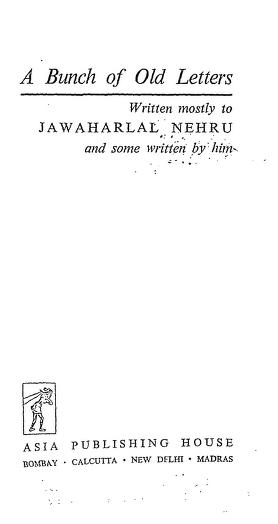A Bunch of Old Letters

About
Summary
Exquisite
TOC
Details
Related
URL
Images
Overview
A Bunch of Old Letters, written by Jawaharlal Nehru, published in 1958, is a compilation of correspondence primarily addressed to him, covering three eventful decades leading up to India's independence in 1947. The collection includes letters from prominent figures deeply involved in India's freedom struggle, such as Mahatma Gandhi, Motilal Nehru, Subhas Chandra Bose, Muhammad Ali Jinnah, Rabindranath Tagore, Sarojini Naidu, Maulana Azad, Vallabhbhai Patel, and Jayaprakash Narayan. These letters offer insights into the political, social, and intellectual landscape of pre-independence India, reflecting the diverse perspectives and debates that shaped the nation's destiny.A Bunch of Old Letters provides a historical account of India's স্বাধীনতা movement through personal communications. The letters reflect a wide array of viewpoints on the strategies, challenges, and goals of the movement. The correspondence between Subhas Chandra Bose and Nehru is of particular interest, revealing their differing views on mobilizing national resistance to British rule. Mahatma Gandhi's letters demonstrate his political instincts, humanity, and respect for dissent. The collection also highlights Nehru's friendships and the respect he garnered from international figures such as George Bernard Shaw, Romain Rolland, and Bertrand Russell.
Importance of Book
Historical Documentation: A Bunch of Old Letters serves as a primary source for understanding the Indian independence movement. The letters provide firsthand accounts of the events, decisions, and personalities that shaped this period.
Understanding Nehru's Leadership: The book sheds light on Nehru's leadership style, his ability to forge relationships with people from diverse backgrounds, and his intellectual approach to challenges.
Insights into the Minds of Leaders: The collection offers insights into the minds of the leaders who shaped India's destiny. The letters reveal their motivations, fears, and aspirations.
Exploring Ideological Debates: The book allows readers to explore the ideological debates that shaped the Indian independence movement. These debates continue to be relevant in contemporary India.
Appreciating the Complexity of History: A Bunch of Old Letters underscores the complexity of history, highlighting the multiple perspectives and interpretations that exist for any given event.
Key Themes
The Indian Independence Movement: The book's central theme is the struggle for Indian independence, as seen through the eyes of its key participants. The letters reveal the strategies, sacrifices, and ideological debates that defined this period.
Ideological Differences: The correspondence highlights the diverse ideological perspectives within the Indian nationalist movement. Differing views on the approach to British rule, the role of violence, and the vision for a post-independence India are evident throughout the collection.
Personal Relationships: The letters showcase the personal relationships between the leaders of the Indian independence movement. These relationships were often complex, marked by both collaboration and conflict.
Nehru's Worldview: The collection offers insights into Nehru's worldview, his commitment to, socialism, and non-alignment, and his vision for India's role in the world.
The Synthesis of Ideas: Nehru believed in the importance of cultural synthesis, advocating for the integration of Asian and European ideas. He saw the exchange and adaptation of new concepts as crucial for a civilization's progress.
Cultural Significance
Reflection of a Nation in Transition: The book reflects a nation in transition, grappling with вопросы of identity, colonialism, and modernization. The letters capture the hopes and anxieties of a society on the cusp of independence.
Understanding India's Intellectual Heritage: The collection provides insights into India's intellectual heritage, showcasing the diverse philosophical and political traditions that have shaped the country.
Promoting Dialogue and Understanding: By presenting a range of perspectives on the Indian independence movement, the book promotes dialogue and understanding among different communities and ideologies.
Inspiring Future Generations: A Bunch of Old Letters continues to inspire future generations of Indians, reminding them of the sacrifices and struggles that led to the nation's independence.
Highlighting Nehru's Vision: Nehru's vision of , parliamentary democracy, industrialisation, socialism, scientific temper, and non-alignment laid the foundation for modern India.
Effects on Society
Shaping Public Discourse: The book has shaped public discourse in India, influencing debates on history, политика, and national identity.
Promoting a Sense of National Identity: By highlighting the shared struggles and aspirations of the Indian people, the book has promoted a sense of national identity.
Encouraging Secularism and Religious Harmony: Nehru's emphasis on secularism and religious harmony, as reflected in the book, has helped to promote these values in Indian society.
Informing Policy Decisions: The book has informed policy decisions in India, particularly in the areas of foreign policy, economic development, and social justice.
Influencing the Indian Nationalist Movement: Nehru's writings, including A Bunch of Old Letters, challenged Western dominance and promoted cultural synthesis, impacting the direction of the Indian Nationalist Movement.
Conclusion
A Bunch of Old Letters is a valuable historical resource that provides insights into the Indian independence movement and the minds of its leaders. The book's cultural significance lies in its ability to promote dialogue, understanding, and a sense of national identity. By showcasing the diverse perspectives and ideological debates of pre-independence India, the collection continues to inform and inspire readers today. Nehru's emphasis on modernization, national unity, and international cooperation remains relevant in an increasingly interconnected world.
Title
A Bunch of Old Letters
Author
Jawahar Lal Nehru
Name of Publisher
Asia Publishing house
Publish Date
1958
Subject
A Bunch of Old Letters offers a personal and introspective look at Jawaharlal Nehru?s life through his correspondence
Vintage
1948-2000
Category
Literary
Sub Category
Biography
Rarity
RARE
